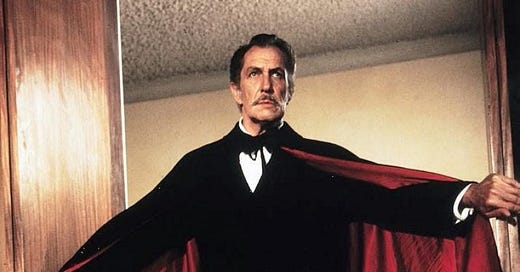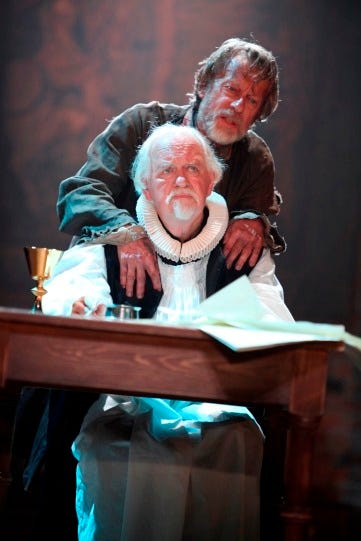Why the best version of a Shakespeare speech is in camp horror classic 'Theatre of Blood'
(According to me)
One of the most irritating experiences I’ve ever had in a theatre was when I saw Written on the Heart, a 2011 play about the creation of the King James Bible produced at the Royal Shakespeare company for the 400th anniversary. Every time one of the characters started quoting a verse, the couple in front of me would nod at each other and say the words out loud sometimes slightly out of time with the actors. Imagine it:
Professional actor: For God so loved the world
Audience pests: That he gave his only begotten son
Actor: That he gave his only begotten son. So that whoever.
Pest: Whoever
Actor: Believes in
Pest: Believes in him
Actor: In him, shall not perish
Pest: Shall not perish but have
Actor: But have eternal life.
Pest: Eternal life.
Unbearable! It’s a good thing I hadn’t brought a copy of the King James to the theatre like they had because I would have hit them round the head with it.
Consider, though, how much worse must it be for an actor performing one of Shakespeare’s most famous speeches and having to watch a sea of lip-syncers mouthing the words, or hear rows of rustling whispers trying to keep pace with you.
This is one of many things that makes Hamlet such a difficult role to play. How can you snap people out of doing this, even if it’s only in their head? How can you make a text sound fresh when, like the proverbial old lady who complained that the play was full of quotations, we so often hear the legacy of Hamlet in its famous lines and not the story they are trying to tell.
But every now and then something magical happens in a production or adaptation that slices through all of this familiarity and forces us to engage with the words as if we have never heard them before. The ‘To be or not to be’ speech from Hamlet gets such a treatment in the British horror comedy masterpiece Theatre of Blood (1970), and it’s a lesson in how to re-energise a text.
If you followed my recent horror moments series on Shakespeare plays you’ll already be familiar with Theatre of Blood. If not, the basic gist is as follows: Edward Lionheart (played by horror legend Vincent Price) is an actor of the old tradition, all billowing capes and resonant diction He has devoted his life to the works of Shakespeare and is heartbroken when a circle of critics pass him over for an award, favouring some young whippersnapper of an actor instead. He accordingly murders the critics one by one, each in the style of a Shakespearean death from drowning in wine like Clarence in Richard III to fried alive like Joan of Arc in 1 Henry VI. It’s loads of fun, go and watch it if you haven’t already.
As campy and outrageous as the film gets, it’s also a deeply sincere love letter to the bard. Yes, you get some outlandish costumes and improbable kills, but you also get to watch Vincent Price delivering some of Shakespeare’s most powerful speeches; Price himself was a brilliant actor sometimes overlooked because of his association with the horror genre, and he’s taking these moments seriously.
In one scene, Lionheart confronts the critics circle about passing him over for the award. He at first strikes a ludicrous figure as he snatches the trophy and stalks onto the balcony. The critics exchange snide comments at his expense. He then starts reciting ‘to be or not to be,’ a speech that Hamlet gives in a moment of crisis and indecision. Lionheart is giving it in his own darkest hour, looking down over the balcony to the murky waters of the Thames below as he says those famous lines:
to die — to sleep,
no more; and by a sleep to say we end
the heartache and the thousand natural shocks
that flesh is heir to…’
Something starts to happen to the critics, and to us as we watch him: we hear with new clarity what2 Hamlet is actually saying in this scene. He is talking, of course, about ending his life, about the choice between fighting on when life becomes unbearable or risking the great uncertainty of death.
‘To die, to sleep, to sleep
perchance to dream—ay, there's the rub:
For in that sleep of death what dreams may come,
When we have shuffled off this mortal coil,
Must give us pause—there's the respect
That makes calamity of so long life.’
We are watching a broken man speak these words, Edward Lionheart himself. His life’s work has been dismissed, his solace in the roles of Shakespeare tarnished by the mockery of critics, his whole approach to his craft passed over as a relic of the past — and now he’s standing on a balcony wondering whether or not suicide is a good idea.
Realising what might be about to happen, the snide comments fade away and everyone rushes to the window. For the first time ever, I wondered whether I was about to watch the speaker of these words succumb to despair:
‘there’s the respect that makes calamity of so long life—’
You’ll have to watch the film to find out what happens, but make sure to appreciate this rare opportunity of feeling what the original audience of Shakespeare’s play must have felt when they heard these words, of living them with a character whose fate we have not been familiar with since school, of wondering what will happen next and catching our breath as they tell their story on their own terms once again.
What are your favourite examples of Shakespeare’s words ex situ? Are there any other stories that have sampled him in a way that reinvigorates a famous speech or line? Make sure to comment below!
Subscribe for more articles on a range of fascinating subjects. I publish my ‘horror moments’ on Thursdays, and other curious content like this on Mondays.






Theater of Blood always has a place in my library! Nice write-up :)
I love this movie. This and the first Dr Phibes movies. I’m also a big fan of Hammer Horror from the 1950s.